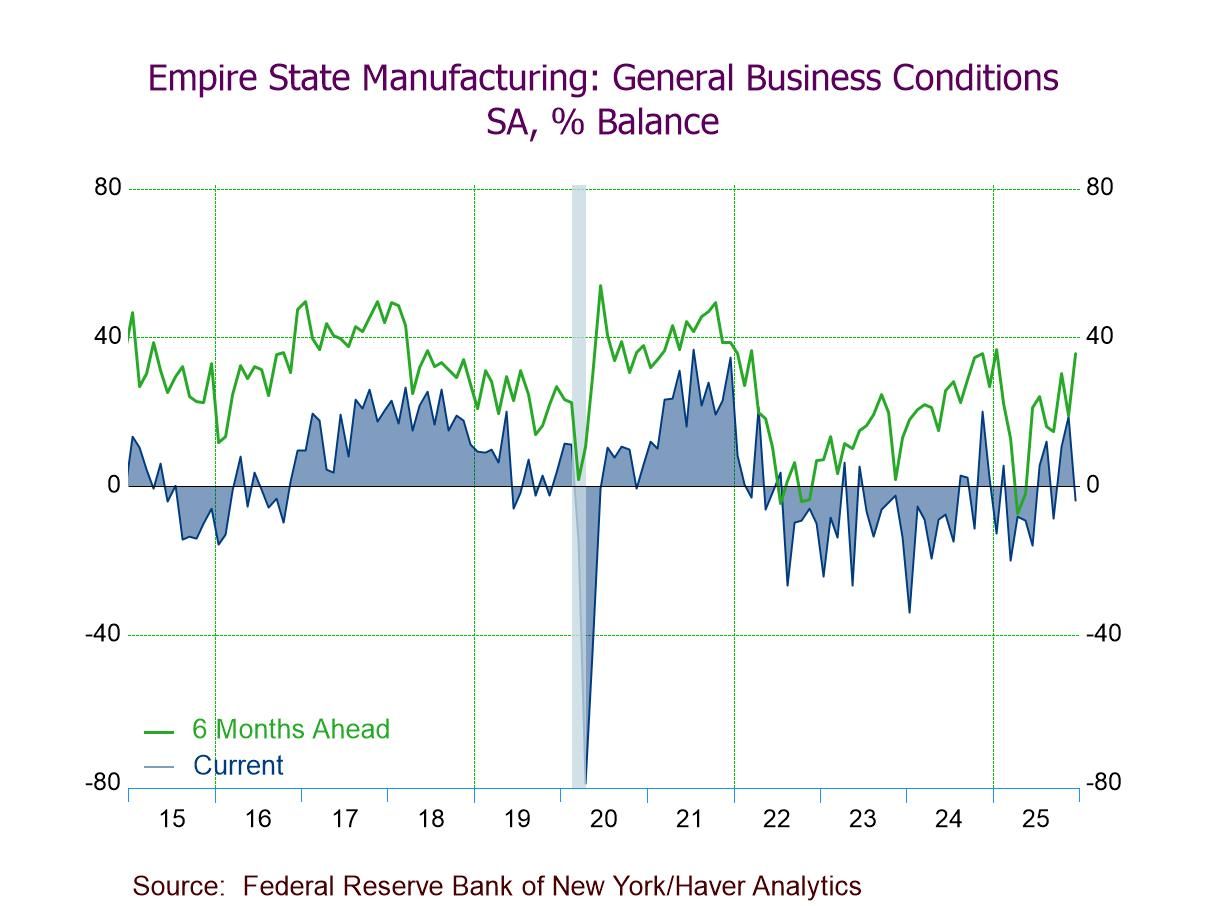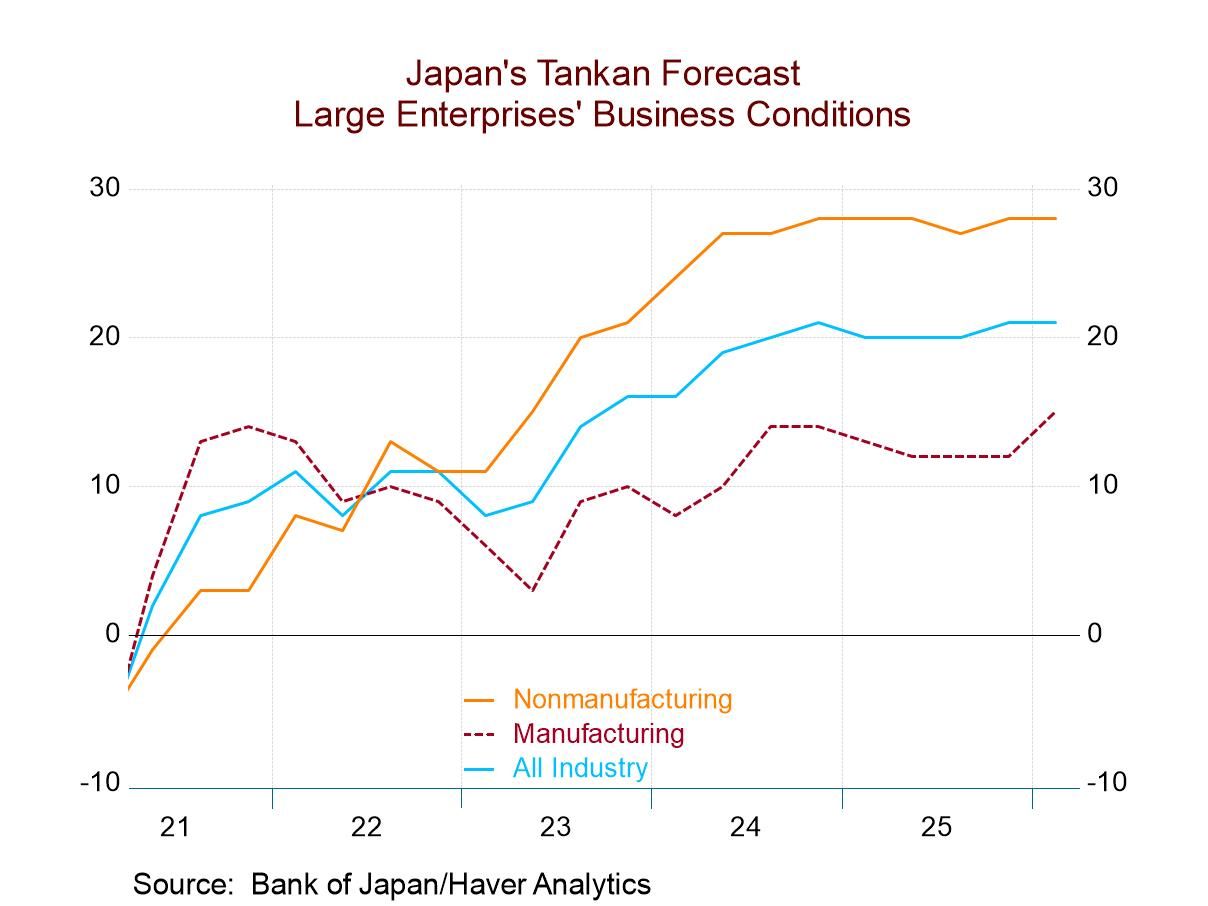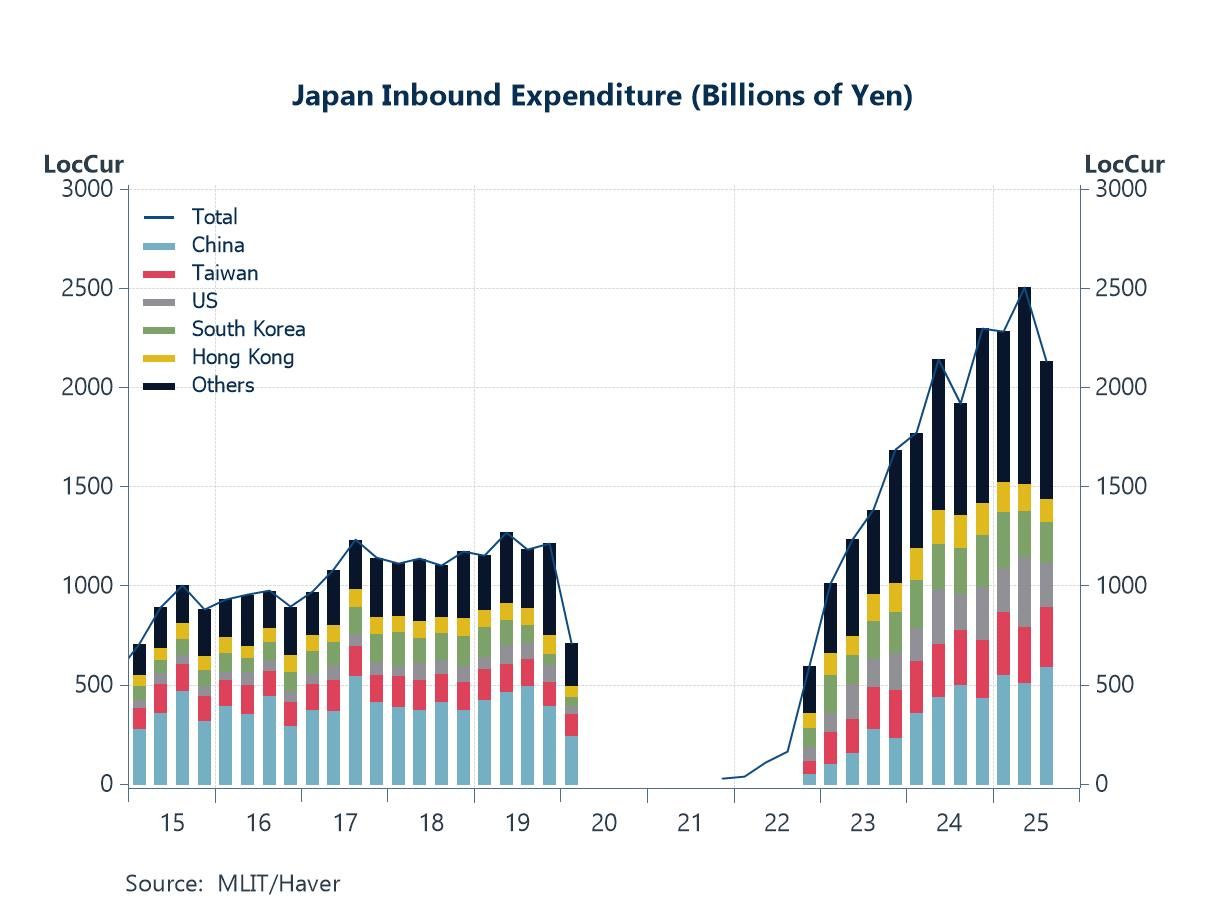 Global| Mar 13 2009
Global| Mar 13 2009U.S. Trade Deficit Shrinks To Lowest Since 2002
by:Tom Moeller
|in:Economy in Brief
Summary
January's U.S. foreign trade deficit narrowed again to its shallowest level since the summer of 2002. The deficit of $36.0B narrowed from the unrevised December figure of $39.0B. Lower oil prices and the U.S. recession acted to reduce [...]
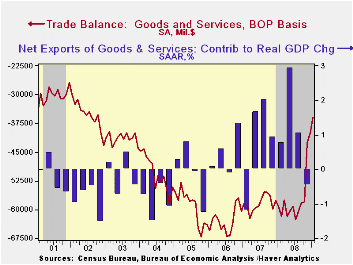 January's
U.S. foreign trade deficit narrowed again to its shallowest level since
the summer of 2002. The deficit of $36.0B narrowed from the
unrevised December figure of $39.0B. Lower oil prices and the U.S.
recession acted to reduce imports to their lowest level since 2005
while recessions abroad reduced exports to their lowest since mid-2006.
Consensus expectations had been for a January deficit of $38.0B.
January's
U.S. foreign trade deficit narrowed again to its shallowest level since
the summer of 2002. The deficit of $36.0B narrowed from the
unrevised December figure of $39.0B. Lower oil prices and the U.S.
recession acted to reduce imports to their lowest level since 2005
while recessions abroad reduced exports to their lowest since mid-2006.
Consensus expectations had been for a January deficit of $38.0B.
Adjusted for price inflation, the trade deficit in goods actually widened, primarily due to lower energy prices. The real trade deficit in goods increased versus December to its deepest since October. It has been roughly stable since last spring.
During January the 20.3% m/m decline in crude oil prices to an average $39.81 caused overall petroleum imports to drop by 18.4% to a level which was half what they were one year ago. In volume terms, however, petroleum imports slipped just 1.4% (-3.9% y/y) and they have been roughly flat since 2004.
Reflecting the U.S. recession, measured in chained-2000 dollars, nonoil
imports fell another 5.1% 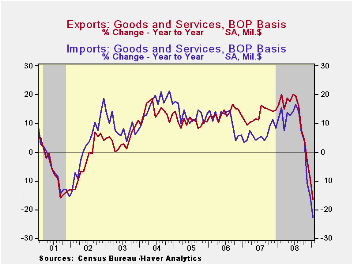 (-17.6% y/y) after similar declines during
the prior two months. The chained-dollar value of imports of automotive
vehicles & parts fell by nearly one quarter month-to-month and
they were down by nearly one half from their year ago level. Further
reflecting the U.S. recession was a 1.4% decline in real imports of
nonauto consumer goods (-10.2% y/y) to their lowest level since 2005.
Real imports of nonauto capital goods dropped by 6.0% (-16.1% y/y) for
their fourth consecutive monthly decline. These imports were at their
lowest since 2005.
(-17.6% y/y) after similar declines during
the prior two months. The chained-dollar value of imports of automotive
vehicles & parts fell by nearly one quarter month-to-month and
they were down by nearly one half from their year ago level. Further
reflecting the U.S. recession was a 1.4% decline in real imports of
nonauto consumer goods (-10.2% y/y) to their lowest level since 2005.
Real imports of nonauto capital goods dropped by 6.0% (-16.1% y/y) for
their fourth consecutive monthly decline. These imports were at their
lowest since 2005.
Services imports again were weak, down for the fifth consecutive month. The 1.9% decline brought them 4.4% below last year's level and reflected lower travel imports (-6.9% y/y). Passenger fares fell by 4.2% versus January of 2008.
Recessions abroad lowered real U.S. exports of goods for the fifth consecutive month. January's 8.6% decline (-17.8% y/y) dropped them to the lowest level since late-2005. The chained dollar value of capital goods exports declined 8.9% (-17.4% y/y) to their lowest level since late 2005. Exports of nonauto consumer goods also dropped hard. The 8.2% decline (-15.7% y/y) pulled them to their lowest since 2006. Real exports of automobiles & parts fell an even steeper 28.5% from December. They are off by half during the last year.
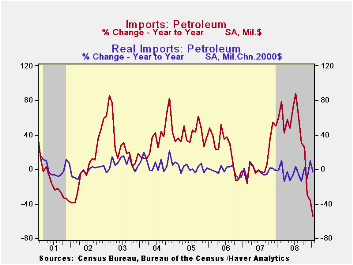 Nominal exports of services fell 2.4%
(-4.6% y/y) for the fourth drop in the last five months. Travel exports
were down 17.9% from their peak during August of last year while
passenger fares fell 16.8%.
Nominal exports of services fell 2.4%
(-4.6% y/y) for the fourth drop in the last five months. Travel exports
were down 17.9% from their peak during August of last year while
passenger fares fell 16.8%.
The U.S. trade deficit in goods with China deepened slightly m/m to $20.6B. Exports to China fell 28.6% y/y while U.S. imports were off just 5.4%. The trade deficit with Japan narrowed sharply to $4.3B, its shallowest since 1997. Imports fell by nearly one third from last year while exports fell 22.8%.
The international trade data can be found in Haver's USECON database. Detailed figures are available in the USINT database.
| Foreign Trade | January | December | Y/Y | 2008 | 2007 | 2006 |
|---|---|---|---|---|---|---|
| U.S. Trade Deficit | $36.0B | $39.9B | $59.2B (01/08) | $681.1 | $700.3 | $753.3 |
| Exports - Goods & Services | -5.7% | -5.8% | -16.4% | 12.5% | 13.0% | 13.5% |
| Imports - Goods & Services | -6.7% | -5.8% | -22.8% | 7.3 | 6.1% | 10.8% |
| Petroleum | -18.5% | -6.7% | -54.0% | 37.0 | 9.4% | 20.1% |
| Nonpetroleum Goods | -6.0% | -6.4% | -18.0% | 1.3% | 4.8% | 9.1% |
Tom Moeller
AuthorMore in Author Profile »Prior to joining Haver Analytics in 2000, Mr. Moeller worked as the Economist at Chancellor Capital Management from 1985 to 1999. There, he developed comprehensive economic forecasts and interpreted economic data for equity and fixed income portfolio managers. Also at Chancellor, Mr. Moeller worked as an equity analyst and was responsible for researching and rating companies in the economically sensitive automobile and housing industries for investment in Chancellor’s equity portfolio. Prior to joining Chancellor, Mr. Moeller was an Economist at Citibank from 1979 to 1984. He also analyzed pricing behavior in the metals industry for the Council on Wage and Price Stability in Washington, D.C. In 1999, Mr. Moeller received the award for most accurate forecast from the Forecasters' Club of New York. From 1990 to 1992 he was President of the New York Association for Business Economists. Mr. Moeller earned an M.B.A. in Finance from Fordham University, where he graduated in 1987. He holds a Bachelor of Arts in Economics from George Washington University.



